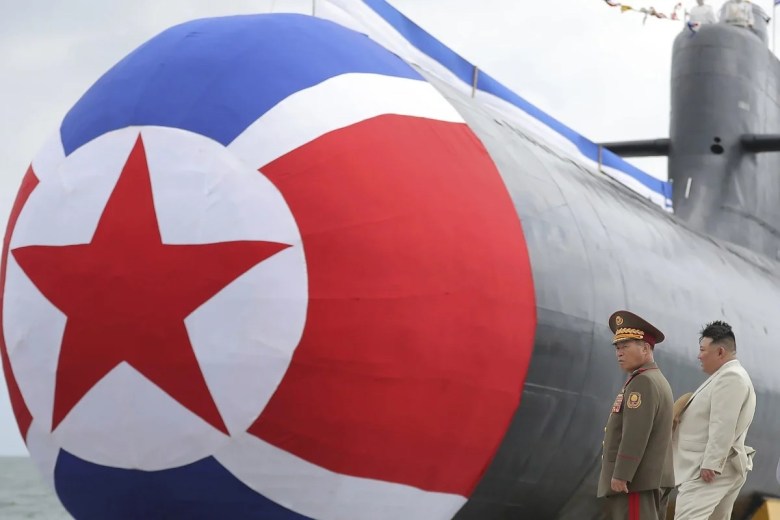Politics
Russia’s Secret Support for North Korea’s Nuclear Submarine Ambitions

Rumors surrounding Russia’s alleged transfer of nuclear submarine technology to North Korea have sent shockwaves throughout East Asia. According to South Korean intelligence reports, Russia may have covertly provided decommissioned nuclear submarine modules, including a reactor and turbine, to North Korea in early 2025. This development connects Pyongyang’s growing military ambitions to Moscow’s ongoing conflict in Ukraine, raising concerns about the effectiveness of US deterrence in the Pacific region.
The reports suggest that North Korean Supreme Leader Kim Jong Un has actively sought assistance from Russia, including advanced fighter jets and nuclear submarine technology, in exchange for military supplies and other resources to support Russia’s war efforts. In March, North Korean state media showcased images of Kim inspecting what was described as a “nuclear-powered strategic guided missile submarine,” although the vessel’s specifications remain ambiguous.
Experts estimate that this submarine could displace between 5,000 and 7,000 tons and potentially carry up to ten nuclear-capable missiles. Such capabilities would present significant challenges for US and South Korean anti-submarine operations in the region, particularly in the Taiwan Strait. North Korea’s submarine development is believed to require substantial Russian support, as the nation has historically struggled to produce compact naval reactors.
If confirmed, the transfer of nuclear technology would violate the Nuclear Non-Proliferation Treaty (NPT), which aims to prevent the spread of nuclear weapons. This breach could lead to severe sanctions against both countries, reflecting the deepening partnership solidified during Kim’s 2023 summit with Russian President Vladimir Putin. Despite the ambitious claims surrounding North Korea’s nuclear submarine program, skepticism remains regarding its actual effectiveness and capabilities.
Many analysts question the viability of North Korea’s submarine project, pointing to past failures involving retrofitted vessels and concerns over noisy propulsion systems that make them vulnerable to detection. Additionally, while the submarine could theoretically provide a second-strike capability, its range and endurance limitations could hinder operational effectiveness beyond regional waters.
Nevertheless, North Korea has compelling motivations to pursue a nuclear submarine program. The regime has previously highlighted its attempts to develop sea-based nuclear capabilities aboard its Amnok-class corvettes and may aim to equip its new Choe Hyeon-class destroyers with similar features. Given that surface vessels are more susceptible to attacks, the push for nuclear submarines underscores a strategic shift in North Korea’s military planning.
The evolving relationship between North Korea and Russia appears to be moving beyond mere transactional exchanges. Edward Howell, in a report from Chatham House, indicates a transition toward a more strategic alliance, evidenced by recent arms deals and potential nuclear technology transfers. This collaboration is further reinforced by the June 2024 North Korea-Russia Treaty on Comprehensive Strategic Partnership, which opposes Western influence and advocates for a multipolar international system.
China, a key ally to both North Korea and Russia, is closely observing these developments. The meeting of Chinese President Xi Jinping, Putin, and Kim during the 80th anniversary of the end of World War II serves as a powerful symbol of their alignment. Despite this, China is cautious about unchecked escalation, recognizing that nuclear proliferation could jeopardize its security and regional influence.
As these alliances deepen, the upcoming US National Defense Strategy (NDS) reflects a shift in focus toward homeland defense and the Western Hemisphere, potentially neglecting countermeasures against near-peer adversaries in Asia. Reports indicate that rising tensions between the US and Venezuela illustrate this recalibration, suggesting that US allies may need to assume greater responsibility for their own security.
The implications of US retrenchment could resonate throughout the Indo-Pacific region. As noted by analysts Kira Coffey and Ryan Fitzgerald, allies may question the reliability of US security guarantees, especially given recent events in Ukraine. With North Korea likely to leverage its military capabilities more aggressively in light of perceived US disengagement, South Korea may be compelled to reconsider its own defense strategies, including the potential development of nuclear weapons.
Japan’s stance, while still strongly influenced by its nuclear taboo, may also evolve as concerns about regional security grow. With Japan possessing significant resources for nuclear development, including 64 nuclear power plants, it remains a potential player in this evolving landscape. Taiwan, facing its own security challenges, has also been flagged by the International Atomic Energy Agency (IAEA) for suspicious nuclear activities, raising the specter of an arms race in East Asia.
In summary, the potential collaboration between Russia and North Korea on nuclear submarine technology could ignite a new arms race across the region. Should the US continue its current trajectory of strategic retrenchment, it may inadvertently encourage neighboring nations to pursue their own nuclear ambitions, reshaping the security dynamics of East Asia.
-

 World5 months ago
World5 months agoSouth Korea’s Foreign Minister Cho Hyun to Visit China This Week
-

 Business5 months ago
Business5 months agoStarling Bank Plans Secondary Share Sale, Targeting $5.4 Billion Valuation
-

 Top Stories5 months ago
Top Stories5 months agoMunsang College Celebrates 100 Years with Grand Ceremony
-

 World5 months ago
World5 months agoPAS Aims to Expand Parliamentary Influence in Upcoming Election
-

 Business7 months ago
Business7 months agoKenvue Dismisses CEO Thibaut Mongon as Strategic Review Advances
-

 Lifestyle6 months ago
Lifestyle6 months agoHumanism Camp Engages 250 Youths in Summer Fest 2025
-

 Sports6 months ago
Sports6 months agoDe Minaur Triumphs at Washington Open After Thrilling Comeback
-

 Sports7 months ago
Sports7 months agoTupou and Daugunu Join First Nations Squad for Lions Clash
-

 Top Stories7 months ago
Top Stories7 months agoColombian Senator Miguel Uribe Shows Signs of Recovery After Attack
-

 World7 months ago
World7 months agoASEAN Gears Up for Historic Joint Meeting of Foreign and Economic Ministers
-

 Health6 months ago
Health6 months agoNew Study Challenges Assumptions About Aging and Inflammation
-

 Business7 months ago
Business7 months agoOil Prices Surge Following New EU Sanctions on Russia









